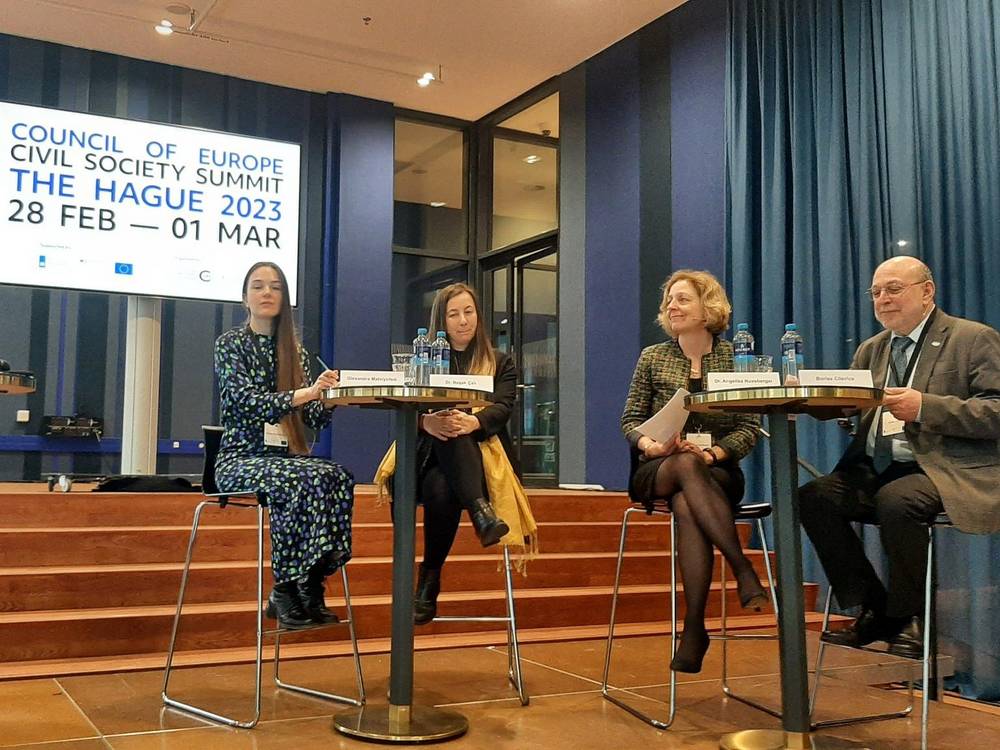Organized by CURE - Campaign for the Defence of Rights in Europe and the Conference of International NGOs of the Council of Europe, the First Council of Europe Civil Society Summit took place in The Hague and online from 28 February to 1 March 2023. The participants recalled the importance of the Council of Europe for the preservation and strengthening of democracy, human rights, and the rule of law in Europe, as well as the need to take effective measures to address current and future challenges in the run-up to the fourth Council of Europe Summit to be held in Reykjavik, Iceland, on 16 and 17 May 2023.
The event was attended by representatives of more than 100 organizations from all over Europe, including Slovenia, including representatives of the European Network of National Human Rights Institutions (ENNHRI). The Ombudsman of the Republic of Slovenia was represented by Dr Simona Drenik Bavdek, Assistant Head of the Centre for Human Rights.
The aim of the first Civil Society Summit was to exchange views on the current challenges facing the Council of Europe and to develop priorities for the necessary reforms of the Council of Europe. Participants agreed that it is not enough to reaffirm the values of the Council of Europe and that the organization’s work must be adapted to current and future challenges. The need for the Council of Europe to involve civil society and independent institutions more actively in its work in the future was stressed, which could also contribute to raising its profile. The Summit also concluded that concrete action is needed, in particular on the implementation of international standards at the national level, as well as on issues relating to challenges such as artificial intelligence or the climate crisis.
The Summit adopts the Hague Civil Society Declaration on the Reform of the Council of Europe, which calls on Heads of State and Government to take concrete steps to strengthen the Council of Europe as Europe's premier institution, based on the values of promoting democratic development, protecting human rights and the rule of law, and strengthening civil society across Europe. The declaration has been presented to the Deputy Secretary General of the Council of Europe, the President of the Parliamentary Assembly of the Council of Europe, and the representative of the Icelandic Presidency to the Committee of Ministers of the Council of Europe and will be presented publicly after 10 March 2023.
The Civil Society Summit also expressed its support for Ukraine and its people. The Ukrainian Parliamentary Ombudsman, Dmytro Lubinets, addressed the participants via a video link and raised expectations for stronger action. It is also with this aim in mind that the Declaration on Ukraine was adopted to address the criminal accountability gap and to highlight the role of the Council of Europe in this regard. It also shows that additional measures are needed to help victims, especially children, and other vulnerable groups. A Declaration on Turkey was also adopted, highlighting, among other things, the importance of the Istanbul Convention on Preventing and Combating Violence against Women and Domestic Violence.
The Ombudsman of the Republic of Slovenia supports the conclusions and warnings of the Summit and underlines the importance of the Council of Europe for the development of the values of democracy, human rights, and the rule of law in Europe and Slovenia. This May, Slovenia will celebrate 30 years of membership in this international organization, which was the first with which the Slovenian Ombudsman established its cooperation in November 1994, immediately after the Ombudsman first took office. At the same time, the Ombudsman expects that the forthcoming Fourth Council of Europe Summit will duly address the necessary reforms of the organization, focusing in particular on:
- strengthening democracy, human rights, and the rule of law in Europe, including strengthening civil society and media freedom, freedom of association, the independence of the judiciary, and gender equality;
- ensuring adequate resources for the organization’s operations and strengthening effective multilateralism;
- opening up the organization to civil society and national human rights institutions;
- setting up more effective mechanisms to enforce judgments of the European Court of Human Rights and to implement the recommendations of the committees monitoring the implementation of the various Council of Europe conventions;
- addressing new challenges of the environmental crisis, artificial intelligence, and the rights of the elderly through the adoption of new legally binding international instruments.
The Ombudsman has been cooperating with the Council of Europe at several levels and has recently strengthened his cooperation with various committees monitoring Slovenia's implementation of the Conventions (e.g., GREVIO, GRETA, ECSR, ACFC). The Ombudsman also monitors the enforcement of judgments of the European Court of Human Rights by Slovenia, and two representatives of the Ombudsman are external members of the Inter-Ministerial Working Group for the Coordination of the Enforcement of Judgments of the European Court of Human Rights. The Ombudsman also intervenes as a third party in specific cases before the European Court of Human Rights, independently and in the framework of the ENNHRI, when it is deemed necessary, and works with the ENNHRI on the creation of new standards.

![[Translate to English:] Vrh civilne družbe Sveta Evrope [Translate to English:] Udeleženci vrha civilne družbe Sveta Evrope](/fileadmin/_processed_/4/b/csm__CivilSocietySummit_8_vir_CURE_Campaign%40CURE_coe_80d00cc5b7.jpg)